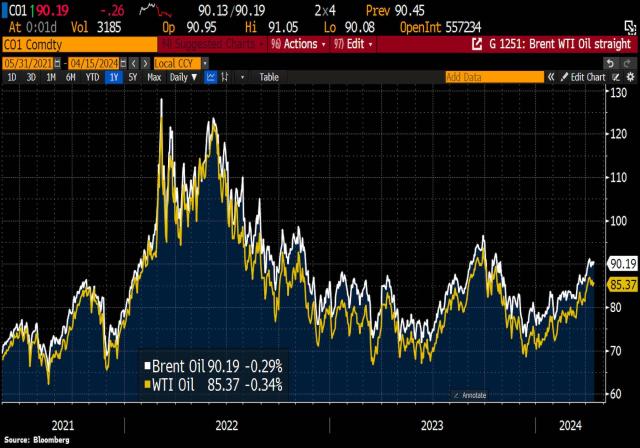On Monday, oil prices experienced a decline following Iran's retaliatory attack against Israel over the previous weekend. This dip occurred despite Brent crude, a principal international oil benchmark, trading near $90 a barrel, following a rise in anticipation of Iranian actions that had pushed prices close to a six-month peak last week.
Market analysts are closely monitoring how ongoing conflicts might disrupt global supply chains, especially considering the critical role oil plays in the global economy. Oil's price swings significantly impact global markets due to its widespread use in producing fuels such as petrol and diesel, which are vital for transportation and industry.
Historically, geopolitical tensions have led to sharp increases in oil prices. For example, following Russia's invasion of Ukraine in 2022, oil prices skyrocketed to $120 a barrel due to supply concerns amplified by Western sanctions on Russia, a major oil exporter. This spike had a cascading effect, driving up prices for a wide range of goods as businesses grappled with increased operational costs.
Crude oil market's doubts about the Israel-Iran conflict have been ceased.
— Forever Rebate (@ForeverRebate) April 17, 2024
Crude Oil price is back to a large box range: 84.05-87.67. Note that the box shrinks to: 84.74-86.18.
There is not much room to trade the broken cloud, unless it coincides with a breakout!#WTI #USOIL pic.twitter.com/4kU3SUEGu4
In the current scenario, the focus is on Israel's potential response to the attack. Israeli Defence Minister Yoav Gallant warned that the confrontation with Iran "is not over yet," signaling possible further escalations. This statement followed Iran's deployment of drones and missiles towards Israel, a retaliation for an alleged Israeli attack on Iran's consulate in Damascus on April 1st.
By the end of last week, Brent crude had reached $92.18 a barrel, its highest since October, before retracting to approximately $89.50 on Monday. Concurrently, gold prices, often a bellwether for investor sentiment during times of uncertainty, also retreated after peaking at a record $2,431.29 an ounce on Friday.
According to energy analyst Vandana Hari, the drop in oil prices suggests that the market currently does not perceive an imminent additional supply threat. However, other experts like Peter McGuire of XM.com anticipate volatility, predicting a surge in oil prices if Israel intensifies its military actions.
"Oil was little changed after rising earlier, with traders waiting for clues on how Israel will respond.
— Art Berman (@aeberman12) April 16, 2024
"Brent was trading near $90 a barrel."https://t.co/Y2mxicuYHu#energy #OOTT #oilandgas #WTI #CrudeOil #fintwit #OPEC #Commodities pic.twitter.com/WV1sGoubZd
The broader financial markets are also feeling the effects of the uncertainty. Stock markets in the Asia-Pacific region and the UK's FTSE 100 index saw declines on Monday as investors assessed the potential fallout from the ongoing conflict.
Despite the immediate market reactions, April LaRusse from Insight Investment noted that the markets might remain indecisive until more information is available. She explained that prolonged geopolitical tensions in the Middle East have led to a more measured response from markets, avoiding panic as an initial reaction.
The US House of Representatives is poised to vote Monday on legislation aimed at countering China’s purchase of Iranian crude oil as part of package of bills being brought to the floor in response to Iran’s attack on Israel. https://t.co/tewrXtfekb
— Bloomberg (@business) April 15, 2024
This situation underscores the fragile balance in global energy markets, particularly given Iran's significant role as the world's seventh-largest oil producer and a key member of the OPEC cartel. A critical point of concern is whether the conflict will impact shipping through the Strait of Hormuz, through which about 20% of the world's oil supply passes, making it a strategic chokepoint in global energy supply routes.


